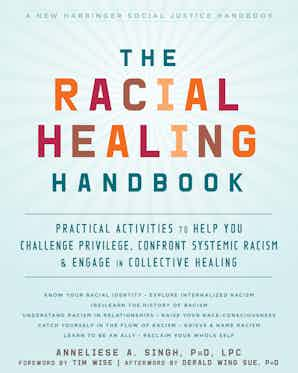By Anneliese A. Singh, PhD, author of The Racial Healing Handbook
The brutal murder of George Floyd sparked something visceral in us—the realization that we can and must each do more about challenging racism in our own lives. Street protests and activism have been crucial in the efforts to dismantle racism, and the truth is we come home to internalized white supremacy that is still deeply embedded in our families, workplaces, schools, and communities. We start to feel distracted, hopeless, and believe that racism has no end.
What can we do to deepen and sustain our racial healing and justice efforts? How can we sustain our outrage and channel it in efforts that change policies, procedures, and systems?
Five Steps You Can Take Right Now for Racial Healing
(Re)Commit to Racial Healing
Healing from racism is a process of proactive individual actions and strategies you can practice throughout your lifetime. When we see the murders of Black and Brown people, we express our outrage about this injustice. We simultaneously deepen our commitments to everyday racial healing for the rest of our lives.
Talk about Your Racial Healing with Others
As you begin to heal from racism, you give folks in your personal and professional circles the opportunity to heal from racism, too. If you are White or a Person of Color, share the specific actions you are taking to stop participating, either knowingly or actively, in the system of racism and White supremacy that was designed to favor some people and not others.
(Re)Learn the History of Racism
Do some digging into the history of policing in the US—it started with slave patrols. Deepen your questions about policing and read up on the history of policing of Black and Brown people in Minneapolis. Then, research the same history right where you live locally, and connect with and support the folks who are working on racial equity and justice initiatives.
Grieve, Rest, Take Action
As we challenge racism, we grieve. Through this grief, we will move through the emotions of denial, bargaining, anger, sadness, and fear (sometimes all at the same time!). The system of racism is designed to keep our grief stuck in the denial and bargaining stage so we don’t ask sustained questions about its roots in White Supremacy and anti-Blackness. Expect that you will feel all the emotions involved in grief, and that these emotions can be draining. Rest when you need time to process your emotions, and then funnel your grief into actions of racial healing and justice. Our small actions can add up to big changes over our lifetimes.
Engage in Collective Racial Healing
Healing from racism is best done in community with people who are committed to their own racial healing journey. I have developed a treasured and honest community of People of Color and White people in my life who will support me and help me stay accountable to my racial healing. Because racism is persistent and embedded in systems, and enacted by people, it is important to also develop racial justice communities to provide us with opportunities as White people and People of Color to participate in movements designed to reduce the impacts of racism and increase racial healing for larger communities of people.
You can find downloads from The Racial Healing Handbook here, including a study guide for book clubs and a supplemental guide for clinicians. You can read more about the author here.
Anneliese A. Singh, PhD, LPC, is a professor and associate dean of diversity, equity, and inclusion in the college of education at the University of Georgia. Singh is cofounder of the Georgia Safe Schools Coalition to work on reducing heterosexism, transprejudice, racism, and other oppressions in Georgia schools. She is also cofounder of the Trans Resilience Project, where she translated her findings from fifteen years of research on trans people’s resilience to oppression into practice and advocacy efforts. She is author of The Queer and Transgender Resilience Workbook. She’s delivered widely viewed TedX Talks, and recorded a podcast for APA on her research with transgender youth and resilience.



 Why Journaling Is Especially Helpful to Adult Children of Emotionally Immature Parents
Why Journaling Is Especially Helpful to Adult Children of Emotionally Immature Parents